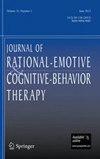Rational Emotive and Cognitive Behavior Coaching Intervention for Promoting College Students’ Financial Risk Tolerance and Attitudes Towards Financial Risk
IF 1.4
4区 心理学
Q3 PSYCHOLOGY, CLINICAL
Journal of Rational-Emotive and Cognitive-Behavior Therapy
Pub Date : 2023-10-09
DOI:10.1007/s10942-023-00523-0
引用次数: 0
Abstract
Abstract In this study, we reported the effect of an online business coaching intervention based on the rational-emotive and cognitive behavior therapy coaching (RE-CBT coaching) approach that was tested to determine if it can improve college students’ financial risk tolerance and attitudes towards financial risk. The researchers used an open label, group randomized control design. During the study, fifty-four participants were part of the online business coaching group, whereas fifty-three participants were part of the control group. Prior to and immediately after the coaching program, as well as three months later, quantitative data was collected. Posttest data based on test of between-subjects effects revealed that online business coaching program based on RE-CBT coaching approach was significantly helpful in the improvement of students’ financial risk tolerance and attitudes toward financial risk compared to control group. Follow-up data based on test of between-subjects effects further revealed that the significantly helpful effects of online business coaching program based on RE-CBT coaching approach on students’ financial risk tolerance and attitudes toward financial risk were sustained when compared to control group. According to the findings, online business coaching based on RE-CBT coaching approach has the potential to enhance the financial risk tolerance and attitudes toward financial risk among college students.

理性情绪认知行为指导干预促进大学生金融风险承受能力和金融风险态度
摘要在本研究中,我们报告了基于理性-情绪和认知行为治疗指导(RE-CBT指导)方法的在线商业指导干预的效果,并对其进行了测试,以确定它是否能提高大学生的金融风险承受能力和对金融风险的态度。研究人员采用开放标签、分组随机对照设计。在这项研究中,54名参与者是在线商业指导组的一部分,而53名参与者是对照组的一部分。在培训项目开始前、结束后以及三个月后,我们收集了定量数据。基于被试间效应检验的后测数据显示,与对照组相比,基于RE-CBT指导方法的在线商业辅导项目对学生金融风险承受能力和金融风险态度的提高有显著的帮助。基于被试间效应检验的随访数据进一步显示,与对照组相比,基于RE-CBT指导方法的在线商业辅导课程对学生金融风险承受能力和金融风险态度的显著帮助作用持续存在。研究发现,基于RE-CBT指导方法的在线商务指导有可能提高大学生的金融风险承受能力和对金融风险的态度。
本文章由计算机程序翻译,如有差异,请以英文原文为准。
求助全文
约1分钟内获得全文
求助全文
来源期刊

Journal of Rational-Emotive and Cognitive-Behavior Therapy
PSYCHOLOGY, CLINICAL-
CiteScore
3.50
自引率
18.80%
发文量
49
期刊介绍:
The Journal of Rational-Emotive and Cognitive Behavior Therapy is an international journal that publishes scholarly original papers concerning Rational Emotive Behavior Therapy (REBT), Cognitive Behavior Therapy (CBT), behavior therapy, cognitive-behavioral hypnosis, and hypnotherapy, clinical and counseling psychology, psychiatry, mental health counseling, and allied areas of science and practice. The journal encourages scholarly debate amongst professionals involved in practice, theory, research, and training in all areas of scholarship relevant to REBT and CBT. The Journal is particularly interested in articles that define clinical practice and research and theoretical articles that have direct clinical applications. The Journal seeks theoretical discussions and literature reviews on the cognitive bases of the development and alleviation of emotional, behavioral, interpersonal, personality, and addictive disorders. We consider submissions on the applications of REBT and CBT to new areas of practice and client populations. The Journal considers the term Cognitive Behavior Therapy to represent a generic, overriding category or school of psychotherapy approaches that includes many different theories and techniques. The journals encourages research that clearly identifies the specific hypothetical constructs and techniques being measured, tested, and discussed, and the comparison of the relative influence of different cognitive processes, constructs, and techniques on emotional and behavioral disturbance. The Journal provides a timely introduction to unexplored avenues on the cutting edge of REBT and CBT research, theory, and practice.The Journal publishes:discussions of the philosophical foundations of psychotherapiestheory-buildingtheoretical articlesoriginal outcome research articlesbrief research reportsoriginal research on the support of theoretical models development of scales to assess cognitive and affective constructsresearch reviewsclinical practice reviewsempirically-based case studiesdescriptions of innovative therapeutic techniques and proceduresadvances in clinical trainingliterature reviews book reviewsUnder the guidance of an expanded, international editorial board consisting of acknowledged leaders in the field, the journal disseminates current, valuable information to researchers and practitioners in psychology, psychotherapy, psychiatry, mental health counseling, social work, education, and related fields.Manuscripts usually are less than 35 pages, double-spaced, and using 11 or 12-point font. If the authors need more space to communicate their research or ideas, they should write to the editors to discuss this issue and provide a rationale why more than the commended number of pages is needed.
 求助内容:
求助内容: 应助结果提醒方式:
应助结果提醒方式:


